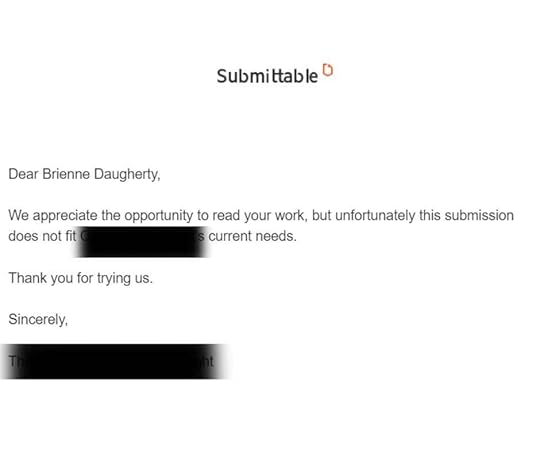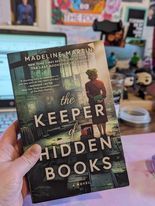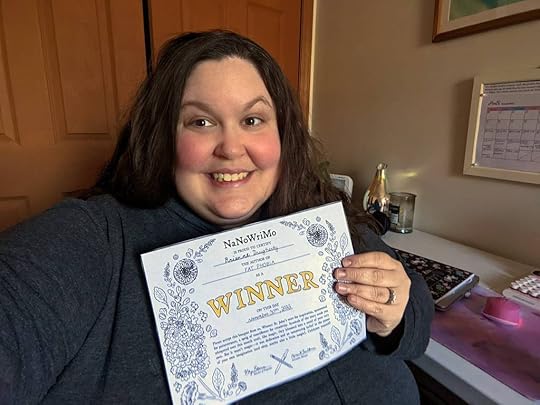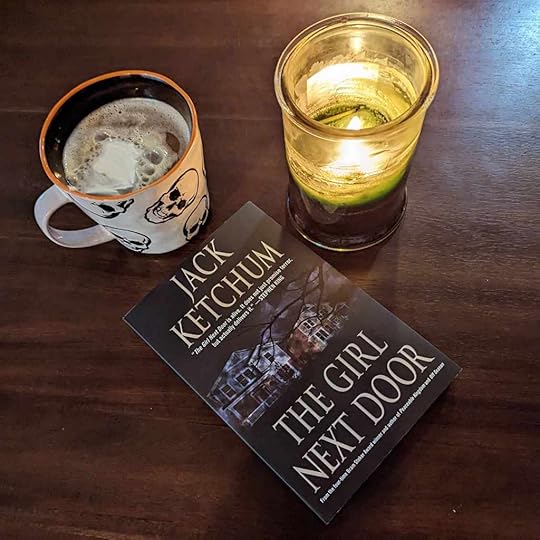Brienne Daugherty's Blog, page 2
April 15, 2024
The Hunt for Validation
I was recently on a Zoom call discussing edits and suggestions for one of my stories. I was explaining to my friend that the number of rejection letters I’d received lately was feeling like a lot and was the reason I hadn’t done more writing.
Let me be frank – I don’t like talking about this. I’m not embarrassed to share that I’ve received rejection letters. I think if you’re a writer of any stripe who has never received one then, well, I’d like to take your class. What bothers me about sharing this openly is that I know the advice I’ll receive.

“Being a writer is like being a musician or an actor. It’s really competitive and only a few people ‘make it.'”
“You know, Stephen King got 200 rejection letters before someone published Carrie.”
“Writing’s gotta be your side hustle. You can’t rely on it for a full income.”
And the worst – “You need to write for you. It doesn’t matter what anyone else thinks. You have to get your validation internally.”
That last one might have been said by my therapist. And here’s the thing – he’s not wrong. None of my lovely, well-meaning friends or my husband have been wrong when they’ve said these things.
Writers know how competitive their field is and we’ve all heard about that famous one who received rejection after rejection until one day, like magic, an acceptance letter arrived in their mailbox and their entire career was made. We know that too.
As for the money aspect of all this I could really give a shit. Don’t get me wrong, I’d like to make a profit on the sale of my book, but I’d really just like to see more people read it.
I write for me. And I write for David and sometimes the kids. I do get a sense of fulfillment when I finish a story and it feels complete. I relish it when David reads one of my stories and stares, impressed, as he re-reads the last few lines. That’s a great feeling.
What’s more is I don’t feel like a fraud calling myself a writer. I don’t need someone else’s validation for that. I’m a writer. I write. Sometimes well. But for some reason that I can’t explain I need some sort of reinforcement. I need someone with some punch to vouch for me. Some sort of writer street cred.
I’ve submitted my manuscript to a few publishers and no one’s bitten yet. That’s fine. I didn’t expect the first book I wrote would be a masterpiece. I’m learning and growing. I continue to submit my short stories of various word counts to different publications. I suppose I’m hoping for just one of them to respond and say, “Congratulations, you’ve done writing!”
Most of these contests/deadlines don’t offer cash prizes and let’s be honest, we know that anthologies are often mostly read by the writers in them and their families/friends. So it’s not financial gain or even readership that I’m looking for in this instance. There seems to be this need to hear someone who knows a thing or two about writing say, “This is where you belong.”
Unfortunately, there doesn’t seem to be a way for me to give that feeling to myself. Oh well, therapy at 11am.
March 28, 2024
Book Review: When No One is Watching
A book has to be pretty special for my husband to hear me read a few snippets and decide to pick it up for himself. That’s exactly what happened with When No One is Watching by Alyssa Cole. However good you think this book will be, it’s better. Cole expertly weaves together a tale about grief, isolation, distrust, and camaraderie while slipping in a budding romance.
But if you asked me what this book is about I’d say loss. In it, we lose people (though “lose” may not be the entirely appropriate term here), we lose our surroundings, we lose our culture and we may just lose ourselves. And I say “we” because I feel like I am walking right alongside Sydney as she experiences the gentrification of her home and community. It’s infuriating, especially when you consider how all too real this situation is.
That’s not to say this book doesn’t tick off the spooky boxes. It falls into the mystery/thriller/horror categories for a reason. There are several great movies that I’d like to compare it to, but I feel like that’d be giving too much away.
Things that this book left me pondering: learning to trust after betrayal(s) is hard, but vital. Some people really are trying to help. But that includes trusting your instincts and when something feels off it probably is. We have more in common than we think we do and the real battle is rich versus poor. And the ones who came before us hold more value than we like to appreciate. They’ve been here before and we need to look to them for the wisdom necessary to forge ahead.
I know all of that sounds pretty vague, but I hesitate to give away anymore for fear of ruining the mysteries of this great book. The subject matter is dark, but there are laugh out loud moments sprinkled throughout. It was impossible to put down. Just ask my husband who read the second half in one evening.
5/5 stars
February 26, 2024
I Don’t Wanna (Plus a Special Announcement!)
This was a tough weekend for me. I sat down at my laptop on Friday with every intention of completing the formatting of my manuscript so I could complete the process of making my book available in paperback format. By Saturday night I was a crying, hyperventilating mess. (Big hugs to my sweet husband who sat patiently listening and rubbing my back.)
I won’t bore you with the minute details, but basically page numbers and spacing became gigantic issues that I couldn’t seem to resolve no matter what I did. Each time I tried a new tactic and reuploaded my manuscript into the previewer it looked the exact same. And each time it took a piece of my sanity.
After midnight on Saturday, and somewhere around my 25th attempt at uploading it I decided I no longer wanted to be a writer. The upload problems were frustrating, but they were more of a final straw. Writing is a beautiful, magical process with the power to connect people and spark imaginations. When I decided I wanted to become a writer, or more accurately, when I decided I wanted writing to be my thing I had a very specific vision in my mind. And this was not it.
I pictured a simple, cozy little cottage-core life. There I’ve got soup warming in the crockpot and bread baking in the oven. I pour myself a little cup of coffee and sit at my desk in front of a window with drifts of snow passing by outside. My cat warms my feet as I tip-tap away on my laptop writing the next great story. Eventually a publisher becomes interested in my book and it becomes available in sweet little local bookstores. I thought this dream was achievable simply because I wasn’t looking for best-seller fame or even to make a full-time living. But that was wishful thinking.

Let me be clear – it’s not the occasional rejection letter that got to me. It was everything else. Writing, being a writer, is not just about writing. In fact writing and editing are a smaller factor in the experience than we’d like them to be. To be a writer (and get your stories read) you have to build a marketing presence on social media, post regularly about things related to writing, build a mailing list, design your book covers, learn how to professionally query, learn how to professionally edit, learn how to professionally format for both digital and paperback/hardcover and you have to do it all with little to no financial resources for the proper software, instead relying on free programs and offers of help, all while you improve your writing chops. This was not the cozy writing life I envisioned.
I went to bed Saturday, having tossed the proof copy of my book across my office in frustration, fully convinced this dream was dead. And then, because I have trouble letting things go, I woke up Sunday morning, made some chili, took my coffee into the office with my cat and eventually figured out my page numbers and spacing problems.
All that is to say: the paperback version of Fat Phobia is available now on Amazon! Please buy it and help restore some of my sanity. If you do, make sure to leave a review and tell me how much you love the spacing.
FacebookInstagramTikTokFebruary 13, 2024
Book Review: 100% Match
I know this is gonna sound weird, but hear me out okay? Promise? Okay, here we go…this book is hilarious. No, I’m not kidding! If you’re currently staring at the cover of this beauty in total doubt of that statement that’s completely understandable. But I have to say, this book was so much fun!

Technically I think it’s considered part of the “Extreme Horror” genre which I’ve made my thoughts clear about in the past. The only linking factor that seems to connect books labeled within this genre seems to be a big ‘ole trigger warning for gross stuff. So far in exploring this side of “horror” I’ve enjoyed a creepy, unsettling book, an extremely moving book, and two gross for gross’ sake books. This is my first extreme horror comedy, if you will.
It’s funny from the moment you take it out of the Amazon box, honestly. It’s the tiniest little thing, barely bigger than my palm and is therefore, a short and easy read. And yet despite its brevity we’re still able to full invest in a character and get a super satisfying twist ending. That part I won’t spoil for you, but let’s just say the reveal is great!
While there’s definitely still the gross stuff to contend with I’ll say it serves to make the character, richer? *gag*
100% Match by Patrick C. Harrison III is getting a 4/5 stars for hilarious squick.
February 6, 2024
Book Review: The Keeper of Hidden Books
**POSSIBLE SPOILERS**
Okay – historical fiction is not usually my go-to genre, but when I saw the cover of Madeline Martin’s book on Goodreads and learned it was about saving Polish culture from the nazi-takeover I was ON BOARD.

Unless you’re a self-professed bibliophile there may be a “perfect” age at which to read this book. I think anyone can enjoy it, but I’m not sure if younger 20-something me would have been so deeply moved by this story. In my ripe-old thirties, and after several years of Trump/white christian nationalism/banning books, this story hits a lot harder. Just like our protagonist Zofia, my perspective has shifted quite a lot after what I’ve experienced.
Zofia’s perspective is what makes this book so unique. We are looking at the nazi takeover of Poland from the perspective of a proud Polish woman who desperately wants to protect her Jewish best friend – and she goes to incredible lengths to do so. What makes this so interesting is the fact that because Zofia isn’t Jewish (and by extension not living in the Jewish ghetto) she doesn’t have access to all the information about what’s going on. This really made me think about what it must have been like to experience this.
We read historical accounts of the Holocaust and, in my opinion, are rightfully horrified by what we read. Imagine being in the middle of it, but NOT knowing what to expect. Information is doled out to Zofia bit by bit throughout the novel and this allows the reader to understand and sit with the anxiety and worry affecting the Polish people.
On a more positive note, however, the thing I loved most about this book was the artful way Martin wove the NECESSITY of books throughout the whole tale. Even in the darkest moments of war and violence, people longed for stories to take them away from their troubles. Imagine a world so desolate that a book becomes almost as valuable as a loaf of bread to a starving person. Incredible!
This was such a nice break from the horror that I typically read. It really made me eager to get started building my home library collection of classics and more fired up than ever to prevent the modern-day nazis from banning our books! Because it was historical fiction it was also really cool to read about which parts were true and which parts Martin changed or added.
5/5 ***** Highly recommend!
January 30, 2024
Maybe Next Time
I’m an all-or-nothing type person. It’s just the way I’m wired. My perfectionist streak has lost me a lot of opportunities over the years and it’s something I’m actively working on in therapy. Since childhood I have made a habit of quitting activities when they begin to feel out of my depth, preferring not to do them at all rather than do them inexpertly.
Writing was one of those activities for me. I have always been told I am a talented writer. The gifted classes, Power of the Pen competitions, and school writing contests led me to believe writing was my calling. Then it grew more difficult. I’d reached the boundary separating natural gift and hard-earned skill and didn’t want to push past it. It didn’t help that I had a strained relationship with parents who desperately decided any creative outlet had to be a moneymaking venture or it wasn’t worth doing.
I held on a little tighter than I had with other hobbies. My second year in college I decided to major in playwriting. I’d always loved theater, I was good at writing, it felt like a natural next step. I didn’t have the phrase, “Imposter Syndrome,” as part of my vocabulary yet, but that’s what hit me like a ton of bricks. I was suddenly surrounded by other writers who were very good. Better than me and more importantly, harder working than me.
I made a last-ditch effort to prove to myself that this was my calling and I followed (more like misinterpreted) my professor’s instructions to think, “outside the box,” on our next piece. So I did. And you know what happened? It. Fucking. Bombed. It bombed so hard. A one-act play that I thought would move the entire audience to tears had them absolutely tickled pink with laughter. I was devastated.
So I retreated to my familiar strategy: give up. And I did. For years. that play bombed when I was 19 years old. I didn’t tap-tap at a keyboard again until I was 31. I’d tried other things in the meantime, but nothing felt right. Nothing moved me the way that writing had.
On a whim I decided to participate in the NanoWriMo (National Novel Writing Month) Challenge. I set a daily word goal and told my family what to expect in terms of my time needs. I did not hit that goal every day. And trust me, the urge to give up because I wasn’t doing it perfectly was strong.

I don’t know what it was. Therapy? Age? Seeing failure/hard work through the new lens of parenthood? Whatever it was, I was able to push past that old habit this time. The days I didn’t meet my goal didn’t matter, because I’d write extra the next day. The final day I ended up writing for hours and you know what? Before midnight I clicked that Finish button and I completed that challenge.
That’s when something in me shifted. Setting a tough goal and meeting it was all I needed to start to believe that it could be done and that the only thing standing in my way was me. Then the thought of editing an entire novel daunted me, but I told myself I’d been daunted by the idea of writing it and hey, I’d done that hadn’t I?
I edited it. I formatted it. I published it in digital version on Amazon and now I’m working on publishing the print version as well. I’ve submitted it to publishers who haven’t bitten yet. And that’s okay.
Writing has opened up a whole new world for me and it has nothing to do with whether or not a contest or publisher is responding well to my work. So far they haven’t, but I save the rejections in a little email folder that I lovingly christened – Maybe Next Time.
Because when you finally believe in yourself enough to keep going, there’s always a next time.
AmazonInstagramFacebookTikTokJanuary 15, 2024
Book Review: The Girl Next Door by Jack Ketchum

– SPOILERS! –
The Girl Next Door by Jack Ketchum is the story of Meg Loughlin and the abuse she suffers at the hands of not only her caretaker and aunt Ruth Chandler but Chandler’s children and a group of neighborhood kids she allows to join in. She is locked in a basement indefinitely and subsequently chained, gagged, blindfolded, beaten, assaulted, raped, burned, and ultimately mutilated until her death. Sounds lovely, doesn’t it?
In seriousness though, it has easily carved itself a place in my top five favorite books of all time. It expands the traditional definition of horror by shining a glaring light on the depths of human depravity. There are no jump scares in this book. No monsters waiting around the corner. But don’t believe for a second that you’ll sleep well after finishing it. The story explores themes of culpability, loss of innocence, and adult/child dynamics from a twisted, “coming of age” perspective.
“You think you know about pain?”
That’s the first question our protagonist David Moran asks us, the readers, as we begin the book. It’s more of an accusation. Do we think we know how bad it can get? David’s going to show us. This is his cautionary tale, but in my opinion, David’s end goal in telling us this story is unclear. At times it seems he simply wants us to learn from his mistakes, to do right where he went so, so wrong. However, there are other moments throughout the book that might suggest we’re working with a somewhat unreliable narrator. He’s sharing a lot with us, but he also desperately wants to assuage some of that deep guilt he’s been carrying and absolve himself of some of his sins. You be the judge of whether or not he’s successful at that.
An interview with author Jack Ketchum in the back of my copy shares his motivation for writing this story in the first person tense. When you read a book the narrator’s voice becomes your voice – the voice in your head. We’re David. We’re culpable simply by continuing to turn the page. We’re in the room watching Ruth torture Meg Loughlin. Are we going to intercede? Put the book down? How responsible are we for what happens to her in the end?
Without outright saying it, David sort of presents the idea that the stage was perfectly set for Meg’s ultimate outcome from the outset. The group of neighborhood kids is used to playing a disturbing children’s activity simply called – The Game. At the end of each session of which one kid is tied to a tree and tormented for hours, sometimes naked. This is one of those instances that feels unsettling to read about, but also one that the readers can hand-wave away as an activity that simply got out of hand without adult supervision. Something that could have happened to any of us as kids. And we certainly didn’t all turn out to be murderers.
The reason for The Game’s transformation from a chance to pelt your friends with apples to an opportunity to perform more insidious acts? Hormones. The introduction of a girl, Eddie’s sister Denise, changes everything and suddenly there is a loss of innocence that informs the rest of the story. That loss of innocence, coupled with the permission the boys receive from Ruth, is all the excuse they need to slide certain behaviors from the “Not Okay” to the “Okay” category in their minds. New mission unlocked.
Ruth’s permission is a crucial element of the narrative and just one of the ways in which the power dynamics between adults and children (particularly in the 1950s) are explored. Early on Ruth enlists her sons, as well as the neighborhood boys, to burn sacks of tree worms out of the trees in her yard. First, let’s just stop and appreciate the imagery of these tween boys lit-er-ally carrying torches for her. Ruth’s the cool mom. She smokes, swears, gives away beers, and never wears a bra. Hers is the house that all the neighborhood kids flock to and why shouldn’t they? She may be more relaxed than most parents, but she’s still a parent after all, right? In the end, no matter how cool she is, the kids are still trusting her to know how far is too far. What happens when the adult in the room is unable or unwilling to set the boundary or say when enough is enough? That’s how David can get away with feeling like-
“Fuck it, let’s see where it goes.”
On the one hand, children in the 1950s were entrusted with more freedom and responsibility than we typically allow them now. David, for example, was pretty young for being tasked with things like cleaning the grill at his father’s bar and running around the neighborhood/visiting the river on his own. However, it could also be argued that they were more infantilized than children today. David’s history with The Game, his raging hormones and desire to see a naked girl, the peer pressure from his friends, and general curiosity all seem to work against him in terms of making up his own mind about this situation. Luckily he doesn’t have to. Ruth’s the adult. She will make up his mind for him.
“In the basement, with Ruth, I began to learn that anger, hate, fear, and loneliness are all one button awaiting the touch of just a single finger to set them blazing toward destruction. And I learned that they can taste like winning.”
It’s interesting to pick up this book, years after its publication, and view it from an incredibly different point of view. You’d have to ask my kids to know for sure, but it seems that a major difference between then versus now is the extent to which kids are treated as people. From David’s perspective in the 1950s, children belonged to their parents. You were property until you weren’t and your opinion didn’t matter.
“Kids were powerless. Almost by definition. Kids were supposed to endure humiliation, or run away from it. If you protested, it had to be oblique. You ran into your room and slammed the door…What you did not do was stand up to an adult and say go fuck yourself, in so many words.”
Like some of the best horror film directors, Ketchum restrains himself from laying out all of the terror at our feet and instead trusts us to create some of it in our minds. At the pinnacle of the book, chapter forty-two, David refuses to share the details of the most horrific abuse Ruth inflicts upon Meg and instead causes us to have to imagine it.
The book is based on the true story of Sylvia Likens, a young woman who was tortured by her caretaker. One extra thing I’m thankful for is the end that Ketchum graced us with. The real-life perpetrator, Gertrude Baniszewski, was convicted of her crimes but didn’t spend long enough in prison, dying of lung cancer only five years after her release. Personally, I’ll take Gertrude’s (Ruth’s) fictional end where David backhands her down a flight of steps and she snaps her neck after shitting herself. This was extremely satisfying to read after knowing the real story and I appreciate Ketchum for this little gift waiting at the end of a truly harrowing book – one that I can’t recommend enough.
January 10, 2024
I’m Dubious About “Extreme Horror”
I’ve always liked to push my entertainment capacity to its absolute limit. My husband doesn’t always get it (and has regretted watching a few of my movie picks) and he’s not alone. The category of people who enjoy consuming FUCKED up shit is definitely in the minority.
As I’ve gotten older however I’ve been able to engage with others in this weird online space and learned I’m not alone. There is a market out there for fucked up shit. My journey began with seeking out fucked up movies. I’ve always enjoyed horror so I thought hey, what could be better than turning the dial up to 11?
I’d work my way down a list of, “50 Most Disturbing Movies of All Time” and as you’d expect some were good, many were not. There’s a certain art to using fucked up shit for entertainment purposes. The films that felt like two hours of strictly gore porn always fell flat, but those with deep stories, complex characters, AND fucked up shit really soared.
Then recently I rediscovered my love of both reading and writing. I’ll save the story for another time, but basically there’s little time to achieve either when you’ve got young kiddos. I thought hey, why not take my love of fucked up shit and see what’s happening in the literary world? Enter – Extreme Horror: (See also – splatterpunk) a subgenre of horror fiction aimed at people like me. Perfect!
I was enticed by the gritty titles, the nasty cover art, the enthralling synopses. But so far I have to say, I’m not impressed. Don’t get me wrong these books are just as gross, disgusting, and bile-inducing as any disturbing film found on a top 50 list, but that seems to be the extent of their merit. I want the disturbing details, the sentences that were hard to write and equally hard to read, but at the end of the day I also want to read a good story.
Despite promising terror the most that some of these books deliver is a real gross-out fest with a lack of narrative arc. If the book is a stand-out and can achieve both the raw, fucked up shit that many of us desire as well as a great story with complex characters then it’s a hit, in my opinion.
I’m going to continue to explore this subgenre and post my reviews on Goodreads, but for now it seems like this subgenre only exists to give writers a place to put all of their gross thoughts with a trigger warning.
FacebookTikTokAmazonInstagramJanuary 5, 2024
Flash Fiction Friday – 100 words
How could she allow this? I gulp a few lungfuls of air trying to appear calm. Tremors begin to pulse through my body, betraying me. My heart pounds in my ears like the rhythmic ticking of a clock marking the seconds to my doom. I’m frantically scanning the room for an escape when I notice the series of nasty, metal instruments to my right. I consider pocketing the sharpest one and threatening my way to freedom when the door groans open.
“It’s nice to meet you, Trevor. I’m Doctor Wilkins. Your mom tells me your tooth’s been bothering you.”
Leave a comment and let me know what you thought about this week’s Flash Fiction! In the future I’ll be posting prompts ahead of time for those of you who would also like to participate and I’ll feature some here and read some on my TikTok channel.
FacebookInstagramTikTokAmazonJanuary 2, 2024
Pigeonholing
It’s a crappy process when you think about it. We live in this extraordinary, magnificent world full of nuance and complexity and we are constantly striving to make everything, and I mean everything, fit into these neatly organized square, stackable boxes. People aren’t square or stackable. They are vibrant little shooting stars of wonder and ferocity, but unfortunately we people live in a world now run by algorithms.
These algorithms determine what’s likable, clickable, and consumable. You’re this or that. You’re black or white. You’re in or out. You’ll make 3,000 versions of the same video because that’s the only video style that receives the dreaded word – engaaaagement.
I’m not unique – I want your engagement too. My problem isn’t unique either: that I’m too unique. This isn’t the first time I’ve made “content” and run into this problem. The problem of uniqueness. I could dedicate myself to doing one thing and one thing only in the name of increasing engagement. I could find a comfortable label and stick with it. The problem with that is I know how that story ends.
Instead of continuing to find joy and fulfillment in taking this creative little heart of mine out for a spin, I will grow bored. Tired. The work will become work and my heart will no longer be in it. And that’s not fair to either of us.
So consider this an anti-pigeonholing experiment if you will. You’ll see me post poetry and share blog updates here. If you choose to follow me on TikTok you’ll see me review books of all varieties with an emphasis on horror, read flash fiction, read children’s books, and any number of other things. If you follow me on Instagram I’ll post reading challenges, writing tips, and more.
If you like writing, reading, horror, speculative fiction, science fiction, kids’ books, poetry, and flash fiction you should probably stick around.
We’re gonna stay unique.



